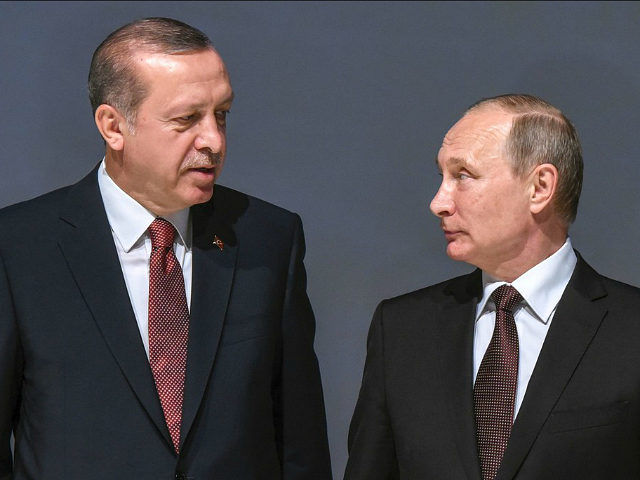Turkish president Recep Tayyip Erdogan will land in Moscow Friday for “high-level talks” expected to concern both economic development and the two countries’ roles in Syria, where Turkey’s opposition to Syrian Kurdish militias has strained relations with Russia.
The Turkish government announced Tuesday that Erdogan would attend a summit with his Russian counterpart, Vladimir Putin, known as the High-Level Cooperation Council. The Council is a bilateral effort to deepen diplomatic ties between both countries. “Several agreements will also be signed during the visit, which is expected to contribute to the development of Turkish-Russian relations,” the official announcement of Erdogan’s visit read. It added that the two leaders will discuss the Syrian Civil War “extensively.”
Russian officials quoted in the Turkish state outlet Anadolu Agency confirmed the intent of the talks as being the further “normalization” of what have been frayed diplomatic relations for the better part of two years, since Turkish planes shot down a Russian fighter jet that had illegally entered its airspace in November 2015.
State Duma Foreign Affairs Committee deputy chair Alexey Chepa told Anadolu that his government was pleased with the “unique” results of their cooperation in Syria against the Islamic State and credited the cooperation with restoring stability to parts of Syria. Syria is currently torn apart by warring factions, including the dictatorship of Bashar al-Assad, a variety of anti-Assad militias, the Kurdish People’s Protection Unit (YPG/YPJ), the Islamic State, and Jabhat Fateh Al-Sham, the former Nusra Front.
Russia supports the Assad regime and tolerates the Kurdish separatist militias; Erdogan’s government considers both terrorist groups, and has vowed to “end the rule of the tyrant Assad” at all costs.
In preparation for Erdogan’s visit, Russian Prime Minister Dmitry Medvedev spoke to Turkish Prime Minister Binali Yıldırım on Thursday. The two reportedly discussed potential trade deals between the two countries; Medvedev reportedly informed Yıldırım that Russia had dropped some sanctions imposed on Turkey following the downed fighter jet incident.
Following that incident, Russia and Turkey cut many of their economic ties for months. Erdogan only first appeared open to the idea of restoring ties with Russia after the failed coup against him in July 2016. Putin, he has repeatedly noted, was among the first world leaders to call him and express support for him against the coup. By the end of July, Erdogan agreed to travel to Moscow.
Little has deterred Turkey and Russia in reestablishing diplomatic ties, including the dramatic assassination of Russian Ambassador to Ankara Andrei Karlov in December by a Turkish police officer. Both sides issued statements condemning the assassination and blaming U.S.-based Islamic cleric Fethullah Gulen for the attack.
“We agree with [Vladimir] Putin that this is a provocation, there is no split of opinion about this,” Erdogan said following the assassination.
Turkey has also accepted an apology from Moscow over a Russian airstrike on Turkish troops in Syria, which Russia claimed was accidental.
New tensions have surfaced in Syria, however. Turkey has insisted on a diminished role for the Kurdish YPG in Syria, demanding they leave the town of Manbij. The YPG cooperates with U.S. troops and have stable relations with Russia but also seek to establish an independent Kurdish state carved out of Rojava, the Kurdish name for Syrian Kurdistan. Turkey fears the success of this separatist movement will inspire the Kurds to carve away pieces of Turkish territory for the creation of Kurdistan.
Yildirim made clear this week that Turkey seeks to attack the Syrian kurds. “If coordination [with the U.S. and Russia] can’t be established, then there could be a risk of confrontation, which we do not wish for,” he said on Wednesday.
Turkey’s, Russia’s, and Amerca’s chief military leaders met on Tuesday to discuss the stalemate over Manbij. The discussion did not appear to ease concerns in Washington, however, as the Pentagon announced the deployment of Marines to Syria this week to aid in the fight against ISIS but also as a “visible sign of deterrence and reassurance” on the Manbij issue, according to Pentagon spokesman Capt. Jeff Davis.

COMMENTS
Please let us know if you're having issues with commenting.